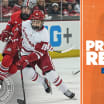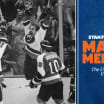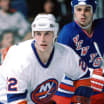Hockey has always been a means to an end for Graeme Townshend.
Over the course of his career as a player, coach, mentor, spectator and advocate for the sport, the former NHLer and New York Islander has always appreciated what it means to be a determined athlete with a fervor for competition. But perhaps more evidently, Townshend has cherished how the sport shaped his character, the tremendous people he met along the way and how it inspired him to pursue the subsequent chapter of his life when his playing days came to an end.
"I always thought 'No one is going to care what Graeme Townsend does when he quits playing hockey' so you may as well take advantage of your status and platform now to do some really good things because that will go on forever, right?" Townshend said. "If you impact a young person's life you literally can change that person's life forever because that person will go on and change someone else's life. So, that's your legacy, person-by-person. Every person you interact with, if you can influence in a positive way they will pay it forward. That's something you can take solace in and be happy."
Alumni Corner: Graeme Townshend
From breaking barriers as the first Jamaican-born NHLer to becoming a busy coach, Townshend continues to make an impact in the hockey community
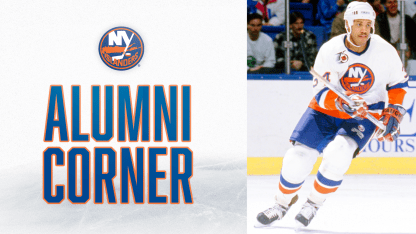
ALUMNI CORNER
MORE ALUMNI STORIES
Alumni Corner Homepage
Paul Boutilier
Billy Harris
Uwe Krupp
Steve Webb
Andy Sutton
Michael Peca
In total, Townshend's playing career featured 13 years of professional hockey split between the NHL (five seasons), AHL, IHL, and WPHL where he totaled 435 points (227G, 208A) in 686 professional games. Following his retirement from hockey, Townshend was later inducted into the Canadian Hockey Hall of Fame in 2006. The 55-year-old eventually became a skating coach for the San Jose Sharks and Toronto Maple Leafs and now runs a hockey school in Maine and is the current head coach of the Jamaican men's junior national team.
While Townshend's impressive resume speaks for itself, by no means did he undergo a traditional trajectory into the NHL. Townshend was originally born in Kingston, Jamaica and at three years old, his father relocated his family with his mother and brother to Toronto, where his younger sister was born.
Some of Townshend's earliest memories upon arriving in Toronto were being perplexed by the game some of the kids in his neighborhood routinely played out on the street or on local ponds.
"At five years of age, I saw these kids playing this strange game with sticks and chasing a tennis ball around on the street," Townshend recalled. "All the kids were playing so I didn't want to be standing around by myself. I asked if I could play and one of the kids said I needed to have a hockey stick. The problem was that I had no idea what the heck a hockey stick was."
In no time, after begging his mom to purchase a wooden hockey stick from the grocery store, Townshend was in the mix with the neighborhood kids and became entranced by the sport. At 10, one of pals, who he still keeps in touch with today, encouraged him to try organized hockey and even set him up with a full ensemble of gear courtesy of his friend's older brothers.
Townshend was so driven to play hockey he would find tryout opportunities for travel teams in newspaper clippings, coordinate ways to get to the rink via public transportation or with friends and do his best to make an impression on the coaches despite not having any prior traditional training.
Watch: Youtube Video
"I remember trying out for a team and being really upset that I didn't make it," Townshend recalled. "And it was about a two kilometer [1.2 mile] walk to get to the bus that would take me home. I was contemplating this walk and decided I needed to know why I got cut. So, I went back into the rink and went up to the coach. I was 12 [years old] and I looked the coach in the eye and said, 'Coach, I'd just like to know what I need to do to make this team next year.' He was kind of taken back, but I was so hungry to just know what I needed to do to get better."
The coach provided feedback that Townshend needed to improve a few areas of his game, but largely his skating. So, that next Monday at school, Townshend made a trip to the library where he came across a book on Bobby Orr. Inside the book, were some drills which Townshend wrote down and practiced until sundown every day.
The hard work paid off and Townshend eventually made a competitive team.
"I remember coming off the ice and hearing all these kids talking about their classes," Townshend said. "I was thinking, 'man these kids must be wicked smart,' but then I realized they were all talking about the same thing. So, I asked them what grade they were in and they were all 14 and in ninth grade. I was only in eighth grade and was 12 going on 13 so it was kind of an eye-opener for me."
In the following years, Townshend continued to catch the eye of coaches and became the No. 2 recruit for NCAA programs. He eventually chose top ranked and defending NCAA Division 1 Frozen Four Champion, Rensselaer Polytechnic Institute (RPI), playing at the school from 1985-89. He captained the team in his junior year.
Townshend continued to bet on himself and upon attending a training camp with Boston, earned his first professional contract in 1989. After two seasons with the Bruins, Townshend signed with the Islanders in 1991.
"I can't tell you how thrilled I was to sign with the Islanders because I was going to be coached by Al Arbour," Townshend said. "I grew up watching this guy's team play in the 80s. I watched those teams dominate hockey. Even though I was a [Toronto Maple Leafs] fan from growing up in Toronto, I loved watching the Islanders play. I thought Al Arbour was a coaching genius and he didn't disappoint. He's one of the most amazing human beings I've ever met in my life. I learned so much from him about playing hockey, but also about life and coaching in general because I have a passion for coaching myself."
Townshend spent the next two seasons from 1991-93 between the Islanders and their AHL affiliate the Capital District Islanders. In total, he played nine games and recorded three points (1G, 2A).
The transition into the organization was smooth as Townshend raved over how easy it was to get along with the players like Ray Ferraro, Pat Flatley, Benoit Hogue, Glenn Healy, Mick Vukota, Mark Fitzpatrick, Marty McInnis and so on.
Townshend still vividly remembers his first and only goal he scored in the blue and orange.
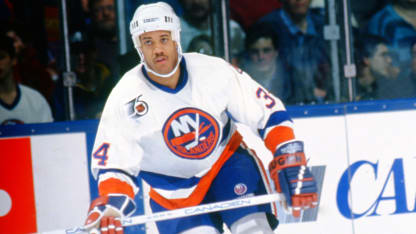
© Bruce Bennett/Getty Images
"It was against the Quebec Nordiques," Townshend said of the goal. "I was playing with Ray Ferraro and Benny Hogue. I remember Ray telling me, 'Next time we get an offensive rush, just drive right down the middle to the front of the net and I'm going to put the puck off the goalies pads and it will come right to you.' He did that exact thing. He beat the goalie wide and came flying down the left boards, took a low slap shot that the goalie kicked out with his pads right to me and I had a wide-open net to put it in. It was the easiest goal I ever scored. I was and still am blown away on the hockey IQ [Ferraro] had."
Townshend noted how 'blessed' he was to join the Islanders and to be around for the overlap as some of the players from the Cup years like Bobby Nystrom, Clark Gillies and Billy Smith were always around the team.
But the one member of the legendary Cup years team who made the greatest impact on Townshend was Butch Goring, who was his coach with the Capital District Islanders. In a lot of ways, Goring had the kind of impact on Townshend that he now hopes to have on players he coaches.
"Butchy really changed my game, I learned the most valuable lessons in my life from Butch Goring," Townshend said. "I remember one time in particular when I was in the minors and I was getting benched, playing maybe two or three shifts per game. So I went to go see Butch. I was pretty heated. Butch never yells, but I was yelling at him. He listened to me. And then he said, 'Okay, I want you to relax. I'm going to tell you something. When I played for the Boston Bruins, Harry Sinden wasn't playing me much. So I went to him just like you're coming to me. He told me, 'Well, you're not doing anything, Butch.' And I said, what you're saying to me now, 'How am I supposed to do anything if I'm not on the ice?' And he told me, 'When you do get a shift, even if it's just one shift, you have to do something memorable on that shift to remind the coach to put you back out there again. You have to do something to force that coach to put you back out there.'"
Townshend retired from hockey in 1999 and made coaching stops in the Central Hockey League and the Greensboro Generals of the ECHL. He eventually transitioned into the NHL where he served as the player development coordinator for the San Jose Sharks and in 2008, was hired as the skating coach for the Toronto Maple Leafs through 2012.
In the years since, Townshend dedicates his time to his own hockey camp based out of Maine that offers boarding camps, clinics and day camps and mentorship programs. He's also committed to growing the sport of hockey in Jamaica, where he became the men's national junior team head coach in 2014 and aspires to make it to the Winter Olympics.
"We're trying to locate a place for the rink and are trying to finalize a purchase of land," Townshend said. "Once we have the land, we'll have the space to build a rink and a casino resort. The idea is that the casino and hotel would pay for the rink so that the kids could play for free. Once we build the rink, we'll also be able to apply for full-member status for the IIHF. Once that happens and gets approved, we'll start playing for world championships and Division 3 levels. We'll work our way up through the rinks and then, hopefully one day - it may not happen in my lifetime - we could play at the Division 1 level and the Olympics. It's a long process. It could take 30, 40, 50 years to get there, but the first step is building a rink."
While Townshend's hockey career and introduction was certainly unique and he has broken barriers as the first Jamaican-born NHLer and one of a few black players in the league, he's also upheld an honest approach to the sport and some of the obstacles he faced along the way.
Now, he's made it his mission to help influence the next generation of hockey players to uphold a honorable work ethic and more importantly, demonstrate a genuine sense of character.
"Turning a negative situation into something positive is always the best solution you can have to any problem or encounter, no matter what it is," Townshend said. "That's the best way to get back at people who say something negative, is to succeed and prevail over that negativity. They're trying to get you off your game or defer you from succeeding with a low blow, so the best thing you can do is just throw it right back and succeed. I feel that's why my job is now. If I can take 14 or 15 kids every year where they can fight intolerance and racism, from a place of experience of working with a black coach and seeing how those words affect people, I think they develop compassion for their fellow man. That's my job, 15 kids at a time, is how I look at it every year."












